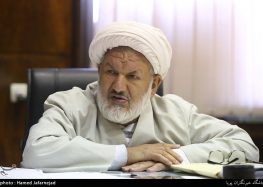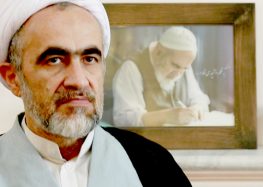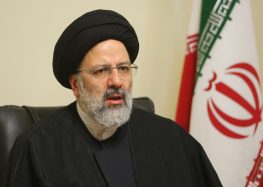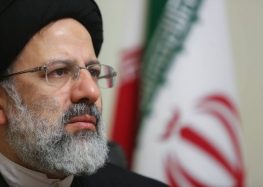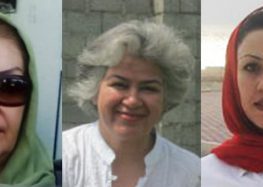Arrest of Cleric Imprisoned for Highlighting 1988 Political Prisoners Massacre “Like a Kidnapping”
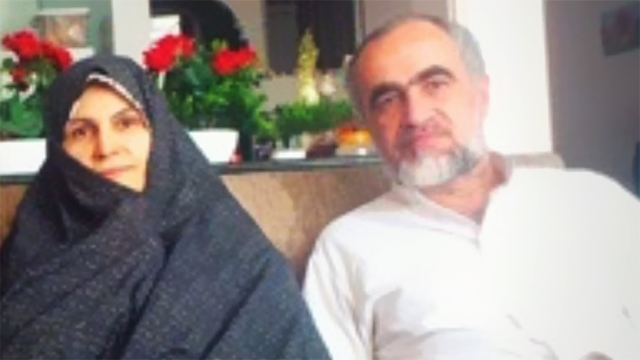
Ahmad Montazeri (right) with his wife Zahra Amlashi.
The wife of Ahmad Montazeri, sentenced to six years in prison for publishing an incriminating audio file on the Islamic Republic’s mass execution of thousands of prisoners in 1988, told the International Campaign for Human Rights in Iran that her husband’s arrest was “more like a kidnapping.”
Twenty-four hours after Montazeri was taken to Evin Prison on February 22, 2017 to begin his sentence, in a solitary confinement cell, he was released on an eight-day furlough (temporary leave), according to the Telegram (social media) channel of the office of his deceased father, Grand Ayatollah Hussein-Ali Montazeri.
“Court officials asked Ahmad to come over for some business,” Zahra Rabbani Amlashi told the Campaign on February 22 before his release. “Just like previous occasions, he went, but this time they kept him. I don’t know if they were afraid he would escape or what, but their behavior is neither humane, lawful or Islamic. It was more like a kidnapping.”
“Ahmad has been taken into custody without receiving a verdict on his appeal or a summons for his arrest,” she said.
“Just a few days (before he was arrested), Mr. Shobeiri Zanjani, (a senior theologian in Qom), asked to see him and said that after some consultations, the prison sentence had been withdrawn,” she added.
“Now we have to consult with family members and see what we need to do. Ahmad was actually pleased with the proceeding of the Appeals Court, especially because there was a rational exchange between the defense and prosecution,” she said. “But the court’s decision shows that the authorities are not interested [in fairness] and reviewing the case won’t make a difference, but we will ask for one anyway.”
“The regime’s problem is that Ahmad defends the truth,” Amlashi told the Campaign. “He will act on his religious and humanitarian duties and won’t sit quiet if he sees that rights are being denied. He doesn’t care if it will cost him.”
“The gentlemen [who are in power] are very upset that the audio file exposed their crimes behind the scenes, but thanks to technology and Telegram, everyone heard about them,” she said.
Montazeri was sentenced by the Special Court for Clerics for reviving memories of one of the darkest periods in Iranian history by releasing a recording of a meeting in which his father, Grand Ayatollah Hosseinali Montazeri—once heir apparent to Islamic Republic founder Ayatollah Ruhollah Khomeini—condemned members of the tribunal set up by Khomeini for ordering the executions.
The court had initially sentenced Ahmad Montazeri to 10 years in prison for “acting against national security,” another 10 years for “publishing a secret audio file” and one year for “propaganda against the state.” It then commuted the sentence to six years, “taking into account his age and lack of prior criminal record,” the judge said in his verdict.
The court also demanded that Montazeri defrock, but suspended the order for three years. Montazeri was ultimately sentenced to six years in prison upon appeal.
In July and August 1988, thousands of prisoners sympathetic to opposition groups, namely the outlawed Mojahedin-e Khalgh (MEK) and communist organizations, were executed and buried in mass graves in Khavaran Cemetery in southwest Tehran.
“The Special Court for Clerics accused Ahmad of sympathizing with the Mojahedin-e Khalgh even though in several court sessions he was repeatedly asked about any connections with the group, but they could not tie him to anything,” said Amlashi.
“They keep accusing him of ties with the Mojahedin, which shows the court has been getting orders from a higher authority and the verdict was dictated to the judge,” she said.
“In any case, this so-called Special Court for Clerics is not even legal. It was set up in 1979 during revolutionary times and its continuing existence is against the law,” added Amlashi.

